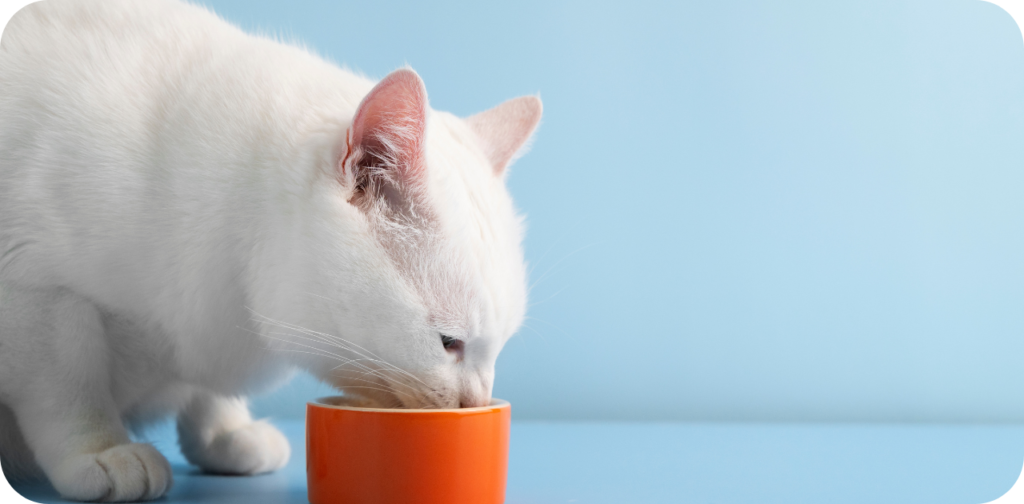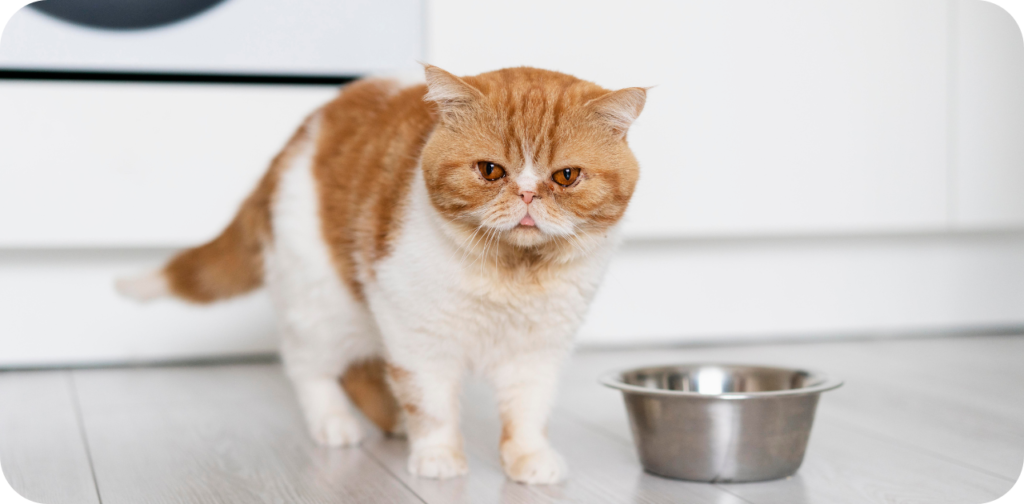Can Cats Eat Yogurt? A Complete Guide for Cat Owners
Table of Contents
Can Cats Eat Yogurt? (Quick Answer)
Can cats eat yogurt? Yes, but only in small amounts and under the right conditions. While cats are carnivores by nature, some can safely enjoy plain yogurt as an occasional treat. The presence of live bacterial cultures in yogurt may help break down lactose, making it easier for cats to digest compared to milk or cheese.
However, it’s important to note that not all cats can eat yogurt without issues. Some may be lactose intolerant or react badly to added sugars or flavorings. Always choose plain, unsweetened yogurt and start with a small amount.
What Is Yogurt Made Of?
Before answering “can cats eat yogurt,” it’s essential to understand what yogurt actually is. Yogurt is a fermented dairy product made by introducing bacterial cultures to milk, which creates its creamy texture and tangy flavor.
Key Ingredients in Yogurt:
- Milk (cow, goat, or plant-based)
- Live cultures (beneficial bacteria like Lactobacillus)
- Optional: sugar, fruits, flavorings, or thickeners
Only plain yogurt with no added sugars or flavors is suitable when considering yogurt for cats.

Is Yogurt Safe for Cats to Eat?
Can cats eat yogurt safely? Generally, yes—if it’s plain and contains live cultures. These probiotics can aid digestion and even offer some immune system benefits. That said, cats do not naturally consume dairy in the wild, and their ability to digest lactose is limited.
According to the ASPCA’s guide on people foods to avoid feeding your pets, some dairy products may cause upset stomachs in pets, but small amounts of plain yogurt are usually well-tolerated.
Things to Watch For:
- Lactose intolerance is common in adult cats
- Flavored or sweetened yogurt may contain xylitol, which is toxic
- Greek yogurt has lower lactose and is a better option
When in doubt, consult your vet before making yogurt a regular treat for your cat.
Do Cats Like the Taste of Yogurt?
Some cat owners wonder: do cats actually enjoy yogurt? Many cats are attracted to the smell and texture of plain yogurt, especially if it’s full-fat. Others may not show any interest.
Behavioral Signs That Cats Like Yogurt:
- Eager licking from your bowl
- Purring or meowing when yogurt is nearby
- Attempting to climb onto the counter to access it
Although not all cats like it, those that do can enjoy plain yogurt in moderation.
Health Benefits of Yogurt for Cats
If you’ve been asking can cats eat yogurt, you might be curious about its benefits. When given properly, yogurt may provide:
- Probiotics that support gut health
- Calcium for strong bones and teeth
- High-quality protein for muscle maintenance
- B vitamins that aid energy production
The National Institutes of Health confirms that probiotics can help balance gut bacteria, which may improve digestion—not just in humans but in pets too.
Important: These benefits are only valid for unsweetened, probiotic-rich yogurt and only in small amounts.
Risks and Side Effects of Giving Yogurt to Cats
Despite the benefits, there are potential drawbacks. Understanding the risks of feeding yogurt to cats is key to avoiding digestive problems.
Common Side Effects:
- Diarrhea or loose stools
- Vomiting
- Gas and bloating
- Allergic reactions
Can cats eat yogurt without risk? Only if they are not lactose intolerant and the yogurt is free of added ingredients.
What Types of Yogurt Are Best for Cats?
When considering yogurt for cats, not all brands or types are created equal. Some are full of harmful ingredients, while others are more natural.
Best Options:
- Plain Greek yogurt (full-fat preferred)
- Organic yogurt with live cultures
- Yogurt with minimal ingredients
Avoid:
- Yogurt with chocolate or fruit
- Yogurt with artificial sweeteners
- Fat-free yogurts with fillers
Can Kittens Eat Yogurt?
Can kittens eat yogurt? In small amounts, yes. However, their digestive systems are more sensitive. Yogurt is not essential for their diet and should be approached with caution.
Tip: Focus on kitten-specific food first. If introducing yogurt, do so very slowly and monitor for any negative reactions.
How Much Yogurt Can You Give a Cat?
To safely answer “how much yogurt can cats eat,” portion control is key.
Feeding Guidelines:
| Cat Weight | Suggested Amount | Frequency |
|---|---|---|
| Under 5kg | 1 teaspoon | Once a week |
| Over 5kg | 1 tablespoon | Once or twice/week |
Start with a small taste, and never exceed recommended amounts.
Can Lactose Intolerant Cats Eat Yogurt?
Can cats eat yogurt if they are lactose intolerant? Surprisingly, some can. The active cultures in yogurt may help break down lactose, reducing digestive stress.
PetMD explains that yogurt often contains less lactose than milk and may be tolerated better, but every cat is different.
Watch for signs of intolerance like gas, vomiting, or diarrhea. When in doubt, opt for lactose-free alternatives.
Signs Your Cat Shouldn’t Eat Yogurt
If your cat exhibits the following symptoms, stop feeding yogurt immediately:
- Persistent vomiting or diarrhea
- Refusing to eat or drink
- Excessive scratching or discomfort
- Lethargy or behavioral changes
If these symptoms occur, consult a veterinarian and avoid giving your cat yogurt again.
How to Introduce Yogurt to Your Cat’s Diet
Introducing yogurt into your cat’s diet should be slow and deliberate.
Steps:
- Start with plain, unsweetened yogurt
- Offer less than a teaspoon
- Observe for any reaction for 24–48 hours
- Gradually increase to a teaspoon if tolerated
- Do not serve daily
Always use yogurt as a treat, not a diet staple.
Homemade Yogurt Treats for Cats
If your cat enjoys yogurt, you can make simple homemade treats using safe ingredients.
Recipes:
- Frozen yogurt + tuna cubes
- Plain yogurt mixed with cooked chicken
- Pumpkin + yogurt mash
Avoid seasoning, sugar, or added salt. Keep it natural.
What Veterinarians Say About Cats Eating Yogurt
Most veterinarians agree: plain yogurt in small amounts is not harmful to most cats. In fact, it can be beneficial due to the probiotics.
Veterinary Partner notes that cats are often lactose intolerant but small amounts of yogurt are usually well tolerated thanks to the bacterial cultures.

Alternatives to Yogurt for Cats
If yogurt isn’t a good fit, there are other healthy alternatives.
Healthy Substitutes:
- Lactose-free cat milk
- Goat’s milk (diluted)
- Probiotic supplements for cats
- Homemade bone broth
These offer similar health benefits without dairy concerns.
Frequently Asked Questions (FAQs)
Can cats eat yogurt every day?
No. Even if tolerated, yogurt should only be an occasional treat.
Is vanilla yogurt safe for cats?
Only if unsweetened—but plain yogurt is still a better option.
What happens if a cat eats too much yogurt?
Overeating can cause digestive upset like gas or diarrhea.
Can cats eat flavored yogurt?
No. Most flavored yogurts contain sugar, xylitol, or artificial ingredients.
Final Thoughts: Should You Feed Yogurt to Your Cat?
So, can cats eat yogurt? Yes—but only plain, unsweetened, and in moderation. Yogurt can be a healthy, protein- and probiotic-rich treat for some cats. But for others, it may cause digestive issues, especially if they’re lactose intolerant or sensitive to new foods.
To stay on the safe side:
- Use plain Greek yogurt
- Introduce it slowly
- Monitor your cat closely
- Consult a vet before making it a regular treat
Yogurt can be a fun, occasional addition to your cat’s diet—but it’s not a necessity. Your cat will thrive best on a high-quality, balanced feline diet.







